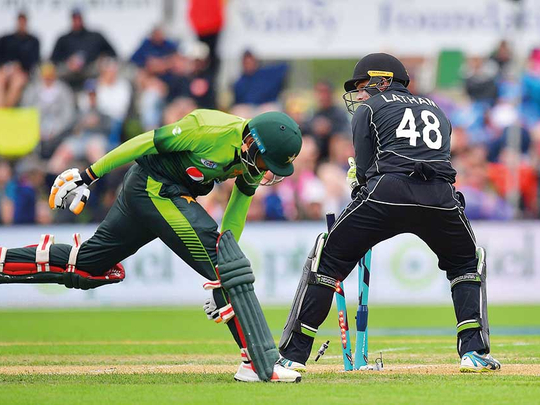
Islamabad: Pakistan batting coach Grant Flower has accepted that playing in New Zealand is a big challenge for Pakistan, and one they have not risen to until now.
“The conditions might have helped New Zealand, but that’s no excuse for some of the shots we played,” he was quoted as saying at a cricket website on Sunday.
“They’re world-class bowlers playing in their home conditions, so they’ll obviously have an advantage on that front. We have players more used to playing on slow, low wickets, and that obviously tells in the way some of the wickets fell,” he added.
New Zealand’s conditions are a world away — in more ways than one — from the kind Pakistan are used to playing in, but the University Oval in Dunedin has one of the slower pitches among international grounds in the country, and it had showed in the first innings, with New Zealand’s batsmen struggling to time the ball.
When Pakistan batted, however, the pitch looked altogether different, the ball whizzing through to the wicketkeeper around shoulder height, and rising sharply off the surface. It might have been to do with the drizzle that was a constant for much of the Pakistan innings, but with the ball coming on to the bat, that could easily have worked in the batsmen’s favour.
“Yeah, well, the ball gets a bit wetter and there’s a bit more zip in the wicket,” Flower said. “But it’s still no excuse, like I said. The guys are good enough to adapt, but at this stage we haven’t been good enough, or smart enough. Against world-class bowlers, you have to be ready from ball one, but in the first ten overs so far, we’ve been blown away.”
It isn’t just the wickets that have been the problem for Pakistan in the first Powerplay. The top order has consistently looked uncomfortable against the lethal opening pair of Tim Southee and Trent Boult, too often sitting on the back foot, looking to survive. It has stood in stark contrast to the way Martin Guptill and Colin Munro have approached the first 10 overs, looking to attack the bowlers and getting ahead of par scoring rates.
“To be honest, it’s apprehension and getting caught on the crease with guys’ lack of foot movement,” Flower said. “The better way is trying to be more positive and try and take on the bowling a bit more. We’ve probably been just a bit apprehensive. I think if you get a few shots away and take the challenge to the bowlers, then all of a sudden they have to think of their lengths a bit, so hopefully we’re going to see a more positive display on our batting side.”
With a result like this, particularly in a game that had the series on the line, things can often fall apart very quickly. And it did when Pakistan toured England in 2016. There, too, the low point was a thrashing in the third ODI, where England amassed a record 444 in the first innings, and ended up winning 4-1.
“I hope not [that this doesn’t become like the England tour],” Flower said with a laugh. “Mickey [Arthur] was quite measured after the match. He had a few words, but it was more just trying to let the guys know that the tour’s not over and we can turn it around very quickly. It sounds like a cliche, but that’s the thing. One good match or two good matches and it’s 3-2 and then you’re going into the T20s, so hopefully the guys are thinking that way, and I suppose time will tell.”












